On this page:
- The history of the school
- Students
- Teachers
- The boarding school experience
- Support for the students
- The school curriculum
- The New York location
- Achievements
- EF Academy and Poland
- Plans for the fall

The history of the school
Our Kids: Can you tell me a little bit about the history of the school? And what is EF Education First?
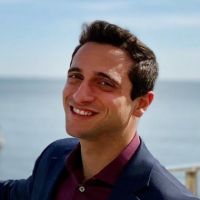 Jason Kirschner: We have to rewind all the way back to 1965, which was EF Education First’s birthday, so we're about 55 years old now. It started with a young Swedish entrepreneur Bertil Hult, who is about 80 years old now. When he was a teenager, he was in the UK for the summer and he found that after just a few months, his English got really good because he was using it all the time. He was inspired to start an organization that would take Swedish high school students to the UK for the summer. There they would study English academically, but they would also go to soccer matches or the cinema, so it was learning through immersion, which Hult got really passionate about. In fact, “EF” did not originally stand for “Education First,” but it was a Swedish acronym for “summer school”.
Jason Kirschner: We have to rewind all the way back to 1965, which was EF Education First’s birthday, so we're about 55 years old now. It started with a young Swedish entrepreneur Bertil Hult, who is about 80 years old now. When he was a teenager, he was in the UK for the summer and he found that after just a few months, his English got really good because he was using it all the time. He was inspired to start an organization that would take Swedish high school students to the UK for the summer. There they would study English academically, but they would also go to soccer matches or the cinema, so it was learning through immersion, which Hult got really passionate about. In fact, “EF” did not originally stand for “Education First,” but it was a Swedish acronym for “summer school”.
Now, 55 years later, EF Education First does a lot of things, being a nexus of language training, educational travel, academic degree programs, and cultural exchange. It even offers an au pair service and an international MBA program. EF Education has a number of international language centers around the world, not only for teaching English, but, for instance, if you're from Poland and you're interested in learning Japanese, you can go to a Japanese language school in Japan.
EF Academy was founded as a high school boarding program originally in England. We had students there from around the world learning English during the summer, so an idea appeared “why can't we do it all year?”, and this is how the EF Academy was born.
Our Kids: Did you develop all your locations one by one or did all the four locations start at the same time?
Jason Kirschner: Three of them started at the same time: EF Academy Torbay in the south-west coast of England, EF Academy Oxford, and EF Academy New York. Torbay and Oxford use the campuses where those language centers operated, so we already had the infrastructure. In New York, we broke away from the language school and founded that campus separately.
EF Academy Pasadena in California is now under construction. We are going to start in September 2021. We purchased a small university and only saved a couple of historic buildings. Essentially, we knocked down most of the campus buildings and started building it up from the ground, so it's all new infrastructure. The campus is being developed as the school of our dreams, so we are very excited about Pasadena.
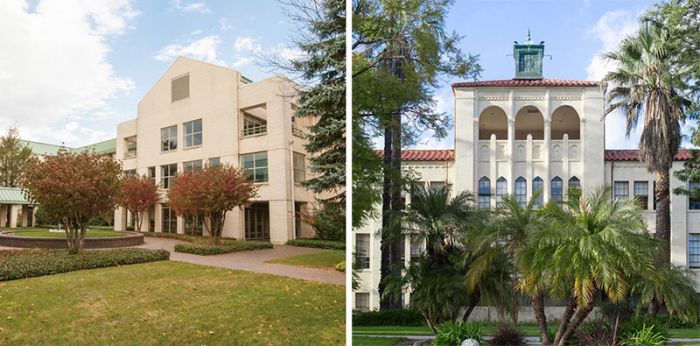
Students
Our Kids: How many students do you accept at the three locations that are working now?
Jason Kirschner: New York is by far our biggest campus. Before the pandemic, we had about 650 students from 60 different countries there. It's almost like the United Nations experiment that has gone amazingly well for us. On both campuses in England, there were about 500 students. They're much smaller schools. This is actually the final year we are admitting students to our UK campuses. We're focusing now on the US, because there's more room for us to grow and do what we want to do on these larger campuses. The British campuses will be taken over by another part of the EF Education First and they'll focus on language education again. The UK schools did great—their academic results have been stellar, but we believe that the future of the EF Academy is with the bigger campuses.
Our Kids: One of the characteristic features of your school, as you say, is its cultural diversity.
Jason Kirschner: Yes, this is very special about EF Academy. Our student body is so diverse that it tears down stereotypes. We don't have any single core group; even Americans constitute just 5 percent of our students. This is why American parents send their kids to our school—they want them to make friends with kids from Poland, Brazil, and other countries, not just Americans. So no matter where you are from, you will find a way to fit in and you can be comfortable in your own skin, because everyone here is different. We're not trying to fit anyone into any particular mold—everyone is free to discover who they are.
Our Kids: Do many students stay for the whole four years?
Jason Kirschner: Yes, although we have different entry points. Some families are a little hesitant to let their 14-year-old go abroad, but they might be more willing to let a 16-year-old attend a boarding school. We do have flexible admissions, as we would rather have more kids get the exposure, even if it's just for two years. We find the best outcomes with the students who stay with us for the whole four years, but we won't force it.
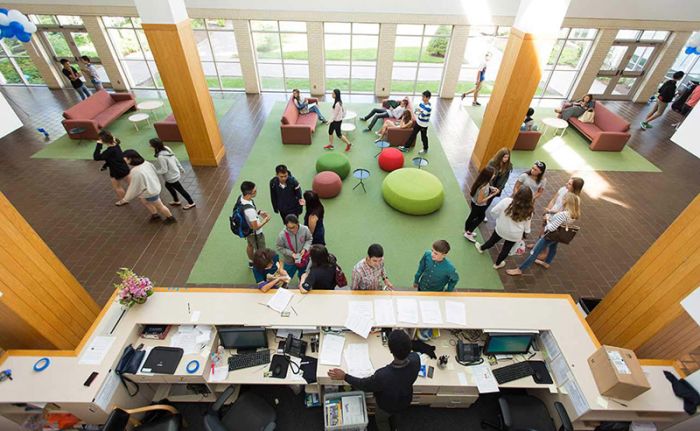
Teachers
Our Kids: Who are your teachers?
Jason Kirschner: Any school is not just the physical structure and the campus, but the students, who in our school come from all over the world, and the teachers, who are also from all over the world and are very passionate about what they teach. About 80% of our teachers have advanced degrees in the subjects they teach. Two thirds of them are American, but even a lot of our American teachers have taught overseas or have some kind of international experience and are very globally minded. For example, our head of science is Mr. Fleming, who taught in Poland and his wife is Polish.
But a third of our teachers are international or at least have dual citizenship of some kind: half American and half Japanese, half Canadian and half Vietnamese, so when we have students coming from all over the world, the teachers get it—they know what our students are going through. of school, Dr. Kuskovski, is from Bielarus. He was educated in the UK and was head of school in India and Switzerland. He always reminds everybody: “I'm not a native English speaker” and he understands what students are going through. When some are struggling at the beginning, it's not due to some cognitive issues, but just because they are not fully comfortable with their academic English yet. We do everything to lift those students up.
The boarding school experience
Our Kids: If you wanted to convince a parent who is apprehensive about sending a kid to a boarding school abroad, what advantages of this kind of school would you point out?
Jason Kirschner: I think the first is that because you live in school, it opens up time. You don't have to worry about going back and forth, because you live at school, so all the resources are right there.
Probably one of the most important things about boarding schools is the unique trusted connections you forge, not only with the adults, such as residential advisors and others who live on campus, but with the friends you make there. You're sharing more of your life with them and you're seeing them a little bit more off guard, not just at school during the day, so you are getting the three-dimensional view of who these people are. Also, the memories you form are so much deeper.
And it's not just the academic side, because there are many great private schools that you can't commute to and I wouldn't say that academics have to be better at boarding schools, but the overall connections you're making are very different. Teenagers are not quite children anymore and not quite adults yet, so this is really a critical time in their lives.
So boarding school enables students to be in this environment where they learn things for the first time. And they're now independent from their parents, which is key, because many students go to universities without ever having lived on their own, outside of their own home, which doesn't always go well. The boarding school is this middle ground, like a training ground for university.
Our Kids: Do students have breaks during the school year to go home and do the parents come to visit them?
Jason Kirschner: You do get to go home, of course. We start school at the beginning of September and we have a winter break from around the second week of December, so you have three full weeks at home. We have a much longer winter break than a typical American school, because we know it's a big deal to travel so far, not only because of the expense, but because you have been away from your family for such a long time. We then have a spring break, which for us is the third and the fourth weeks of March—two full weeks. Most American schools would have just a week. We don't have a February break like American schools. On the whole, we have fewer but longer breaks, and then a typical summer break from the middle of June to the end of August.
Another benefit of being in the New York or Los Angeles area is that it's much easier to get flights, so if you are a parent, you can visit your child.
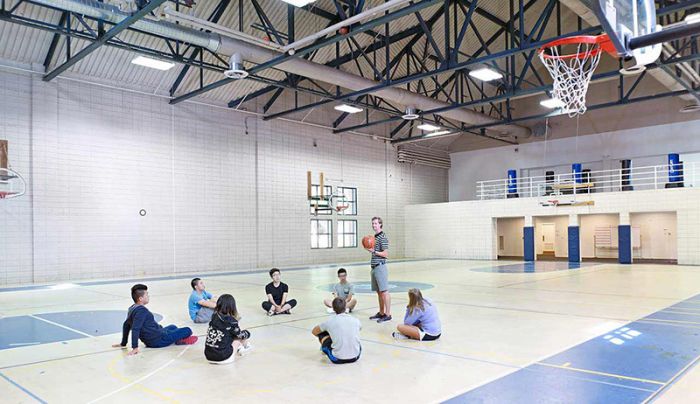
Support for the students
Our Kids: Do you offer support for kids who are feeling really homesick?
Jason Kirschner: We have a whole support network for students through trusted adults. The primary person that they might want to turn to is their “pathway manager,” which is a fancy word for the guidance counselor, but the name reflects more the personal nature of the work these people do. They do play an academic role helping the students to figure out their classes and schedule, but they are the people that students trust: the students can knock on their door just down the hall and have a quick conversation about virtually anything.
Pathway managers are also the main point of contact for parents, so that the parents are not cut off from their children’s education experience. We actually encourage parents to remain involved, maybe not every single day, but at least once a week. Parents have an app where they can check their children's attendance, grades, comments from teachers, so they stay in touch. And, of course, they can proactively reach out anytime to this trusted adult.
We provide more support than just pathway managers. Students have their residence advisors—responsible adults who have apartments in the dorm hallway. Also, students are often close with the school nurses. When they're not feeling well or have a personal issue—something they don't want to talk about even to their parents—they will often go to the school nurse. We also have a couple of school social workers as a kind of last resort, for more serious emotional troubles. They can be helpful when a student is genuinely very homesick and needs someone who is a little more trained.
Our Kids: You say that you prepare students for the best universities in the world. How do you do that?
Jason Kirschner: EF Academy has something that is not offered by every school—a university advising specialist team, separate from the pathway managers. University advisors keep some professional distance from the students’ everyday life because they need to be able to more objectively assess students’ grades, test scores, clubs, activities, and evaluate what programs are realistic and what would be a really good fit for each student. They will speak with the student and the parents to discuss whether the student wants to study in the United States or would rather go to a different country, maybe their home country. Each option has different implications for how to prepare the application. In the United States, there are a couple thousand accredited institutions and it's too much for most international families to grasp that, so the advisor would help to narrow the focus and provide options that the families may not be aware of. There are both one-on-one and group meetings.
Also, as much as we promote the top universities, we don't want every student to think that if they don't go to Harvard, Stanford, or Princeton, they are a failure. There are many amazing programs that can be a good fit for a student, so the university advising team is constantly educating themselves, attending conferences, and also bringing university representatives to our campus to show international students what their options are.
The school curriculum
Our Kids: Since you are no longer admitting students to your UK locations, are you still going to offer your English National Curriculum with the A-Levels in the US?
Jason Kirschner: No, we're not. In the US, we implement the American high school curriculum, which is slightly different in every state. In New York and California we will do state-specific US high school curriculum plus IB.
Our Kids: Which of the two is preferred by the students?
Jason Kirschner: Most of our students are much more interested in pursuing the IB program, which is highly respected around the world, including the US. We encourage our students to at least attempt the IB diploma program, but we don't want to overpressure them. It can go from being a positive experience to a less than positive experience, and we don't want that.
At EF Academy, we have the background of the American high school diploma, which is simply credit-based, so we let our students attempt the full IB diploma, but if they are weaker, for example, in math, they can get an IB certificate in the courses that they are excelling in and are capable of doing at the higher level, but we may ease up on some subjects, covering them under the American curriculum, so that the student doesn’t have to worry about the IB standard and heavy exams for the IB diploma. These students can get the IB certificates on top of the American diploma. The IB diploma is like the gold standard, but you can get a silver medal too and get the American diploma with an IB certificate. It's like an American student taking some Advanced Placement courses.
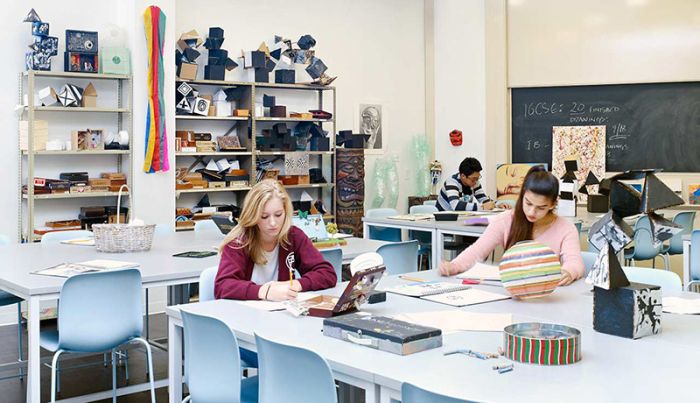
The New York location
Our Kids: How far are you from the centre of New York City—Central Park, Manhattan?
Jason Kirschner: We're just under one hour from New York City, in Westchester county. That's a huge asset for us and we like to think that we have this perfect balance between being close to New York City, but not being surrounded by it. Our campus is just 10 minutes from Hillary Clinton and Bill Clinton's house. There is less pollution, less traffic, so it’s a really good study environment. The campus itself is on 97 acres, surrounded by forest, with trails, deer, wild turkeys. We are under an hour away by public transportation—you can take one train directly to Grand Central Station. NYC is an American and international city, and in some ways it’s like the capital of the world and it’s great to be so close to it. As part of our business class, we can go on a trip to Wall Street, or for an art class, we can easily go to the Museum of Modern Art.
Our Kids: So you probably organize a lot of outings and trips?
Jason Kirschner: Absolutely, when we're not in the middle of the pandemic. In a typical school year, we sometimes allow our older students from Grades 11 and 12—as long as we know where they're going—to go to New York City on their own. They might spend a Saturday on a shopping trip or at a Broadway show. They can have a day when we give them a degree of independence and freedom. They're not little children anymore—they will be at university in a couple of years. We don't let them spend the night unless they're with their parents.
Achievements
Our Kids: What are you most proud of? What do you consider your biggest achievements?
Jason Kirschner: I'm very proud of this global cultural immersive experiment that we've created. It's really a DNA of who we are as a school. I am very happy that we have been able to effectively embrace so many cultures. I've been here for 6.5 years, so I've seen students join in Grade 9 and go through the full course until graduation, and it has been great to see how much they developed and how they discovered their place in the world.
I am thinking of an example of this young man from China, who named himself “Burger” (he said: “What's more American than a burger?”). He came in with relatively limited English. He was a nice young man, motivated to do well, and over the time he spent with us, his English improved immensely and he went from someone who was so focused on science and math (you could tell he had a lot of pressure from his parents), to being really passionate about theatre. When he graduated, he was very confident—he wasn't that shy little international kid anymore, but a fully confident young man, ready to tackle the world. It was really great to see that. We observe these transformations with many of our students.
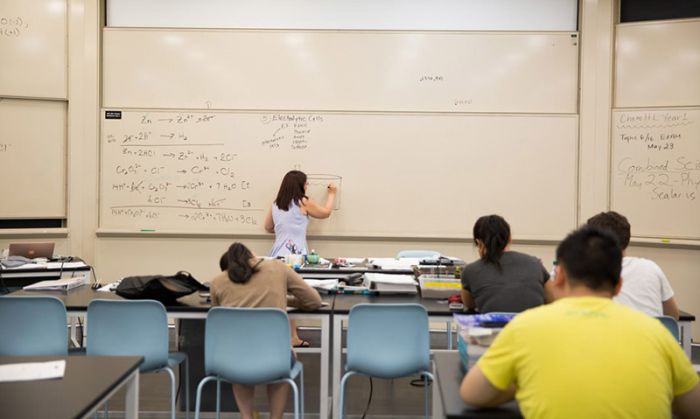
EF Academy and Poland
Our Kids: What's your connection with Poland?
Jason Kirschner: This is another thing we're proud of—over the last few years, new international admissions people have helped us increase the diversity and the outreach of our school. We don't have just a team in the US, but we now have an international admissions team in over 20 different cities and countries around the world.
Poland is new for us. We have had Polish students before, but now we have a full-time EF Academy admissions representative there. We have admissions people in Poland, Ukraine, Africa, Latin America, and many other places. We are making a concerted effort to bring students from countries that other schools have no idea how to reach.
Plans for the fall
Our Kids: What are your plans for the fall?
Jason Kirschner: It will be some version of “normal.” New York has been doing well and, with specific public health guidelines, we think that there is a way to safely open the school. We will have students on campus, but they will be coming in very specific groups, small enough to be tested and monitored for a couple of weeks before they're able to have a more normal school life, hang out with each other, and have in-person classes. The teachers who come and go from campus will have their temperature checked every day and will have to wear masks of course.
We are going to have in-person classes for the students who can come, e.g., returning students who already have visas and are able to join us. For the students who cannot make it right away, whatever the reason is—whether they're unable to get a visa on time or there is a travel restriction in place—we will start with online learning until the point at which they will be able to join us in person.
We've had a lot of experience with distance learning and have the online learning methodology which works really well. It's not the same as in-person learning, so we even offer 25% prorated tuition reduction for the students learning from home. We know it's not the same, but it's good enough to serve as a bridge, where you can start online and as soon as you're ready, when the travel restrictions are lifted and you can get your visa, you can arrive at campus to study with everybody else.
Our Kids: What happened in the spring? Did everybody have to go home?
Jason Kirschner: Yes, everybody had to go home. At the very beginning, Gov. Cuomo and the governors of many states completely closed schools, so we developed our remote learning model. EF Academy has a pretty extensive YouTube channel, where there's a playlist called “Distance Learning Demos”—10 videos with people explaining and demonstrating how the learning worked. Of course, in an international school like ours, where the students come from every timezone on earth, we could do synchronous learning maybe once a week, but otherwise the teachers had to be very flexible and creative. However, there is a method that allows you to carry out online learning and cover quite a lot of the content in an interesting way. I was very pleasantly surprised to see how creative teachers were and how receptive students were. With our school being so diverse, our remote learning/teaching had to step up to accommodate that. Of course, in-person enrollment is considerably lower for 2020, but the good news is that we're part of the EF Education First, where there are other components of the organization that over the last decade have been really successful, so we're stable financially.
We're looking forward to this year and to next year. We are already recruiting heavily for 2021 for both New York and Pasadena. It is really exciting that students can now choose the west coast as well!
People who read this also viewed:
- Study abroad at a private school
- Our Kids interview: Get to know Excellence in Education better
- Our Kids Interview: Get to know EF Academy Oxford
-
Advice Guide
- ABC of educational terminology: Glossary of terms and concepts
- The admissions process
- Advantages and disadvantages of studying in an international school
- The application process
- Benefits of Polish private schools
- Bilingual schools
- Boarding schools
- Choosing a private or nonpublic school in Poland
- Compare schools in Poland
- English schools in Warsaw
- Homeschooling
- International schools in Kraków
- International schools
- Private school interviews
- Music education
- Myths about private education
- Non-public schools in Poland
- School open houses
- Our Kids Interview: Get to know EF Academy Oxford
- Our Kids Interview: Get to know Open School
- Our Kids interview: Get to know Regent College International Schools
- Our Kids Interview: Get to know The American School of Warsaw
- Our Kids Interview: Get to know The British School Warsaw
- Our Kids Interview: Get to know Wrocław Cosmopolitan School (two interviews, new video)
- Poland school profiles
- Private day schools
- Gifted schools & programs
- Private Jewish schools in Poland
- Language schools
- Private school tuition and costs in Poland
- Private schools in Poland
- Private schools in Poland offering French-language immersion
- English immersion schools
- Poland school uniforms
- Private special needs schools in Warsaw
- Public versus non-public schools in Poland
- Private school questions
- Private school rankings
- Reasons for choosing private schools - Our Kids’s survey report
- Religious schools
- Schools and classes for children with ADHD in Poland
- Social primary schools
- Social Schools
- Special educational needs (SPE) certificates
- Special needs schools
- Study abroad at a private school
- The first annual non-public school fair in Poland
- The first annual Our Kids non-public school expo in Warsaw was a great success
- Third Private School Expo in Warsaw - summary
- Types of schools
- Types of schools in Warsaw
- Warsaw preschool costs
- Why private school?
- Why parents go private
-
Grades
- Boarding high schools
- Choosing a high school in Poland
- Mokotow High School Campus - a new Warsaw high school and Thames British School campus
- Montessori nursery schools
- Montessori preschools
- Our Kids Interview: Get to know English Montessori School Katowice
- Our Kids Interview: Get to know FSA School
- Our Kids Interview: Get to know KIDS & Co.
- Our Kids Interview: Get to know Polish British Academy of Warsaw
- Our Kids Interview: Get to know The English Playhouse and The English Primary
- Poland education: grade levels
- Preschools in Warsaw
- Private & non-public preschools
- Private & non-public primary schools
- Private bilingual elementary schools in Warsaw
- Private high schools
- Private high schools in Warsaw
- Private middle schools
- Nursery schools
- Private primary schools in Warsaw
- Social high schools
-
Locations
- Boarding schools in Warsaw
- English schools in Kraków
- International Baccalaureate (IB) schools in Warsaw
- International schools in Warsaw
- Montessori schools in Warsaw
- Non-public schools in Warsaw
- Our Kids Interview: Get to know EF Academy
- Our Kids interview: Get to know Excellence in Education better
- Our Kids Interview: Get to know PRIMUS Non-Public Primary School No. 47 and Non-Public Secondary School
- Our Kids Interview: Get to know the Canadian School of Warsaw
- Our Kids Interview: Get to know The Primary and Secondary Schools of the Sisters of Nazareth in Warsaw
- Private Catholic and Christian schools in Warsaw
- Private day schools in Warsaw
- Private language schools in Warsaw
- Private schools in Bialystok
- Bydgoszcz schools
- Częstochowa schools
- Private schools in Gdańsk & Gdynia
- Katowice schools
- Private schools in Krakow
- Lublin schools
- Olsztyn schools
- Private schools in Poznań
- Private schools in Rzeszów
- Szczecin schools
- Private schools Warsaw
- Private schools in Wrocław
- Zielona Góra schools
- Private schools in Łódź






 POL
POL CAN
CAN